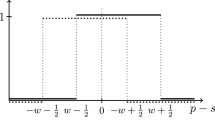Abstract
This paper is concerned with the efficiency of information aggregation in a committee whose members have heterogeneous preferences over a binary decision variable. We study a voting game with a pre-vote communication stage and identify conditions under which full information aggregation is possible. In particular, if preferences are common knowledge and each committee member is endowed with information, full information aggregation is possible despite preference heterogeneity.
Similar content being viewed by others
References
Austen-Smith D. (1990) Information transmission in debate. American Journal of Political Science 34: 124–152
Austen-Smith D. (1990b) Credible debate equilibria. Social Choice and Welfare 7: 75–93
Austen-Smith D., Banks J.S. (1996) Information aggregation, rationality, and the condorcet jury theorem. American Political Science Review 90: 34–45
Austen-Smith D., Feddersen T. (2005) Deliberation and voting rules. In: Austen-Smith D., Duggan J. (eds) Social choice and strategic decisions: Essays in honor of Jeffrey S. Banks. Springer, Berlin
Banerjee A.B., Somanathan R. (2001) A Simple model of voice. Quarterly Journal of Economics 116: 189–228
Blade, S., & Rice, A. (2007). Political advocation with collective decision making. Mimeo, Penn State University.
Chwe M.S.-Y. (1999) Minority voting rights can maximize majority welfare. American Political Science Review 93: 65–97
Chwe, M. S.-Y. (2006). A robust and optimal procedure for condorcet’s model. Mimeo.
Coughlan P. (2000) In defence of unanimous jury verdicts: Communication, mistrials, and sincerity. American Political Science Review 94: 375–393
Doraszelski, U., Gerardi, D., & Squintani, F. (2003). Communication and Voting with double-sided information. Contributions to Theoretical Economics, 3(1), Article 6.
Feddersen T.J., Pesendorfer W. (1997) Voting behavior and information aggregation in elections with private information. Econometrica 65: 1029–1058
Feddersen T.J., Pesendorfer W. (1998) Convicting the innocent: The inferiority of unanimous jury verdicts under strategic voting. American Political Science Review 92: 23–35
Gerardi D. (2000) Jury verdicts and preference diversity. American Political Science Review 94: 395–406
Gerardi, D., McLean, R., & Postlewaite, A. (2005). Aggregation of expert opinions. Cowles foundation Discussion Paper 1503.
Gerardi, D., & Yariv, L. (2003a). Putting your Ballot where your mouth is an analysis of collective choice with Communication. UCLA Working Paper 827.
Gerardi, D., & Yariv, L. (2003b). Committee design in the presence of communication. Cowles Foundation Discussion Paper 1411.
Gerling K., Grüner H.P., Kiel A., Schulte E. (2005) Information acquisition and decision making in committees: A survey. European Journal of Political Economy 21: 563–597
McLennan A. (1998) Consequences of the condorcet jury theorem for beneficial information aggregation by rational agents. American Political Science Review 92: 413–418
Milgrom P., Roberts J. (1986) Relying on the information of interested parties. RAND Journal of Economics 17: 18–32
Persico N. (2004) Committee design with endogenous information. Review of Economic Studies 71: 165–191
Schulte, E. (2008). Communication in committees: Who should listen? Mimeo, University of Mannheim.
Author information
Authors and Affiliations
Corresponding author
Rights and permissions
About this article
Cite this article
Schulte, E. Information aggregation and preference heterogeneity in committees. Theory Decis 69, 97–118 (2010). https://doi.org/10.1007/s11238-008-9118-y
Received:
Accepted:
Published:
Issue Date:
DOI: https://doi.org/10.1007/s11238-008-9118-y



